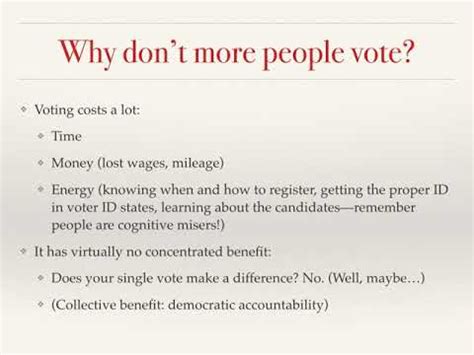In the realm of political science, the concept of rational choice voting holds significant sway. This theory posits that voters make calculated decisions about which candidates to support, based on a rational assessment of their own interests and the candidates’ policy positions.

Understanding Rational Choice Voting
Rational choice voting assumes that voters are rational actors who seek to maximize their own utility or benefit from the political process. They consider various factors, such as:
- Policy preferences: The voter’s alignment with the candidate’s policy positions on issues they care about.
- Candidate attributes: The candidate’s experience, qualifications, and personal characteristics.
- Expected utility: The perceived likelihood that the candidate will win and enact policies that align with the voter’s interests.
Based on these factors, voters weigh the potential benefits and costs of supporting each candidate. They then choose the candidate who they believe will best represent their interests and maximize their expected utility.
Rational Choice Theory in Practice
The rational choice model is often used to explain voter behavior in elections. Empirical research has shown that:
- Voters are more likely to vote for candidates whose policy positions align with their own: A study by the Pew Research Center found that 82% of voters consider a candidate’s issue positions when making a voting decision.
- Experience and qualifications matter: A study by the American Political Science Association found that voters are more likely to vote for candidates with experience in government or who hold a college degree.
- Incumbents have an advantage: Incumbent candidates often benefit from name recognition and a track record, which can increase their voter support.
Criticisms of Rational Choice Voting
While the rational choice model provides a valuable framework for understanding voter behavior, it has also been subject to criticism:
- Simplification of voter decision-making: Critics argue that the model oversimplifies the complex and multifaceted factors that influence voter choices.
- Emphasis on self-interest: The model focuses on maximizing individual benefit, which may not always align with the collective good.
- Limited applicability: The model may be less applicable to elections where emotional appeals, social influences, or other factors play a significant role.
Beyond Rational Choice
Despite these limitations, the rational choice model remains a useful tool for analyzing voter behavior. By understanding the principles of rational choice voting, students of political science can gain valuable insights into the decision-making process of voters and the factors that shape the electoral landscape.
Key Terms for Rational Choice Voting
- Rational Actor: A person who makes decisions based on a rational assessment of their interests.
- Utility: The perceived benefit or value an individual derives from a particular outcome.
- Expected Utility: The perceived likelihood and value of a particular outcome.
- Rent-Seeking: The use of government resources to benefit private interests.
- Median Voter Theorem: The idea that the candidate who wins an election will have policy positions that align with the median voter, the voter who is exactly in the middle of the voter distribution on the policy issue.
Tables for Rational Choice Voting
| Factor | Impact on Voting Decision |
|---|---|
| Policy preferences | Positive correlation |
| Candidate attributes | Positive correlation |
| Expected utility | Positive correlation |
| Incumbency | Positive correlation |
| Criticism | Explanation |
|---|---|
| Simplification of voter decision-making | The model assumes voters are perfectly rational and make decisions based solely on self-interest. |
| Emphasis on self-interest | The model does not account for the influence of social norms, emotional appeals, or other factors on voter behavior. |
| Limited applicability | The model may be less applicable to elections where emotional appeals, social influences, or other factors play a significant role. |
Conclusion
The concept of rational choice voting is a fundamental aspect of understanding voter behavior in political science. By grasping the principles of rational choice theory, students can delve into the complexities of electoral decision-making and gain insights into the dynamics that shape political outcomes.
